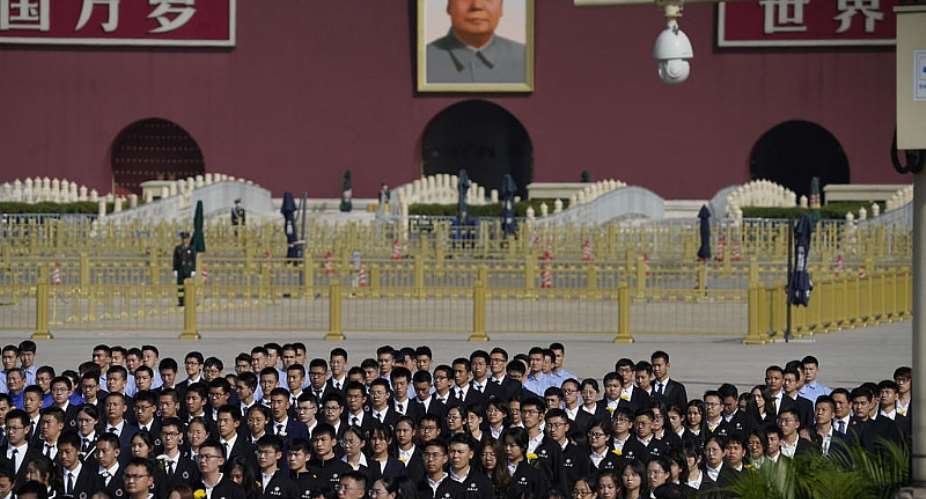China celebrating its 71th National Day. On 1 October, 1949, Mao Zedong proclaimed the People's Republic of China. Xi Jinping, China's current leader is standing on the shoulders of Mao Zedong and Deng Xiaoping, who opened China up to the outside world. Xi shaped China into becoming a global superpower. But his policies are becoming more and more reminiscent of those of Mao – and Hong Kong feels the heat.
Beijing will is staging meticulously choreographed performances under Mao's portrait overlooking Tian'anmen Squre in Beijing, but in Hong Kong, apart from an official flag-rising ceremony, all demonstrations are outlawed.
On Monday, Hong Kong authorities outlawed a planned protest rally by a pro-democracy group.
It forms the latest refusal in the city where protest has been all but outlawed.
Over the years, many in Hong Kong people used the day to take to the streets and protest against Beijing's increasingly intrusive policies.
“The main reason given is not political,” says Jean-Pierre Cabestan, a political scientist with Hong Kong's Baptist University, “it's Covid.” The public is not welcome either at the October 1 flag rising ceremony “in view of the current public health risk,” according to a Hong Kong government statement.
National Security Law
Since June, the city's protesters were muzzled by a sweeping national security law that has criminalised expressions of “Hong Kong independence” and made many think twice to express opinions in a region that used to be known as an island of freedom.
More than 10,000 have been arrested over the last 16 months at protests, and courts are crammed with trials. Many prominent protest leaders face prosecution.
Meanwhile, China seems to have become more and more isolated.
“It looks like China is pushing his envelope everywhere and having difficulty is keeping good relations with its neighbors and its major partners like the United States,” says Cabestan, mentioning China's border skirmishes with India, its increasing assertiveness in the South China Sea and its interference in Hong Kong's politics in spite of “guarantees of autonomy.”
Hardline rhetoric
“China is unhappy to see India moving closer to the US and being less cooperative than before with China,” says Cabestan.
At the same time, says Cabestan, China tries to minimize tensions with which it wants to have partnerships, including the EU, pointing out that the government's actions are “much more subdued and cautious” than hardline rhetoric from the Global Times and other communist outlets publish, while it tries to strengthen ties with developing countries that don't want to get caught in the looming cold war between Beijing and Washington.
“China is trying to take advantage of this in order to not to be perceived as too isolated,” says Cabestan.
But responsible for China's increasing assertiveness and nationalism me be found in the core of the government: CCP General Secretary Xi Jinping.
Return to Maoism?
Since he came to power, his general policy seems to resemble more the one of Mao Zedong than of Deng Xiaoping, the master reformer, who opened China's door to western investment and rose hope to a more liberal atmosphere.
“For a long time, especially since Deng Xiaoping era, the theory prevailed that China is fully pragmatic shed its ideological heritage coming from USSR,” says Alice Ekman, a Senior Analyst with the EU Institute for Strategic Studies.
Ekman, author of the book Rouge Vif, which analyses Xi Jinping's major policy speeches, says that Deng “never fully turned the page of Maoism,” but Xi Jinping brought Mao's ideology back to a level not seen in decades.
“China has become the second biggest economy in the world,” says Ekman. And party ideologues, led by Xi Jinping see the Deng Xiaoping era as a transition period.
Resentment
“a mix of opening up, with capitalism and pragmatism which was helpful to recover from poverty in the post revolution period,” she says.
But now it's time for a new set of guidelines, based on Xi Jinping's socialist-based theories of the “China Dream” that must trigger the Chinese society into becoming the most powerful country in the world.
But it remains to be seen if party members are happy with the policies modelled after the brutal 1942 Yan'an rectification campaigns, that cost the lives to countless party members who did not toe the line, and which coincide with the runup to the 100th anniversary of the founding of the Communist Party in 2021, and the upcoming 20th Party Congress in 2022.
“There is much resentment against Xi Jinping after he decided, two years ago, to revise the Constitution, and extend the tenure of Presidency at least beyond 2023,” says Cabestan.
“That caused quite some ripples within the party,” he says.





 TUC tells informal sector employers to pay their employees the minimum wage
TUC tells informal sector employers to pay their employees the minimum wage
 Prof. Marfo urges good civilian-security relations to promote peace
Prof. Marfo urges good civilian-security relations to promote peace
 I was nearly jailed because of NPP; I’m still ‘pained’ — Hopeson Adorye
I was nearly jailed because of NPP; I’m still ‘pained’ — Hopeson Adorye
 Rising against NPP after being a minister for 15 years is a sin; God will judge ...
Rising against NPP after being a minister for 15 years is a sin; God will judge ...
 Cecilia Dapaah: Reasons behind AG’s advice to EOCO not grounded in law – Martin ...
Cecilia Dapaah: Reasons behind AG’s advice to EOCO not grounded in law – Martin ...
 NPP should have reported Kingsley Nyarko’s conduct to police – Inusah Fuseini
NPP should have reported Kingsley Nyarko’s conduct to police – Inusah Fuseini
 Akufo-Addo cuts sod for MIIF Technical Training Centre
Akufo-Addo cuts sod for MIIF Technical Training Centre
 NPP didn’t struggle to win Ejisu by-election – Samuel Ayeh-Paye
NPP didn’t struggle to win Ejisu by-election – Samuel Ayeh-Paye
 A/R: Achiase Chief arrested for acid attack on community members
A/R: Achiase Chief arrested for acid attack on community members
 Naa Ayemoede returns to school
Naa Ayemoede returns to school
